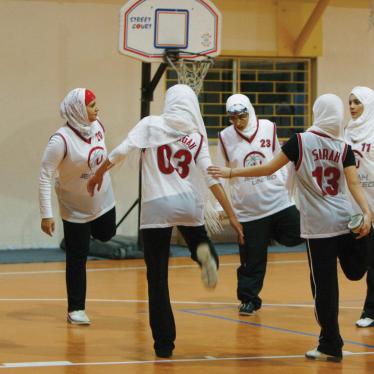(London) – As the clock ticks down to the July opening ceremony, all nations except Saudi Arabia have confirmed that women athletes will participate in the London 2012 Olympics, Human Rights Watch said today. The International Olympic Committee’s executive board is meeting in Quebec City from May 23 through May 25 to hear reports on the upcoming Games.
The International Olympic Committee (IOC) meeting comes as Saudi Arabia’s National Olympic Committee has failed to confirm the participation of women on its national team for the London Games. At the 2008 Beijing Olympics, only Qatar, Brunei, and Saudi Arabia fielded all-male teams. This year, Qatar and Brunei have confirmed they will send female athletes as part of their teams for the first time.
Human Rights Watch has reported extensively on the effective ban on women and girls taking part in sports inside the kingdom, including in state schools.
“Saudi Arabia is the last holdout denying women and girls the ability to take part in sports,” said Sarah Leah Whitson, Middle East director at Human Rights Watch. “The clock is running out for Saudi women to join the Games, and for the international community to insist that the Saudi government allow women to participate.”
Speaking at a news conference in Jeddah on April 4, Prince Nawaf al-Faisal, the Saudi sports minister and head of the Saudi National Olympic Committee, said: “Female sports activity has not existed [in the kingdom] and there is no move thereto in this regard. At present, we are not embracing any female Saudi participation in the Olympics.”
This statement violates the Olympic Charter’s 6th Fundamental Principle of Olympism, that any form of discrimination on the basis of gender is incompatible with the Olympic movement, Human Rights Watch said.
“The Saudi government’s position should trigger serious scrutiny by the Olympic family,” Whitson said. “The dismal and unequal conditions for women and girls who seek to practice sports in Saudi Arabia need to change now.”
In February, Human Rights Watch released a report,‘“Steps of the Devil”: Denial of Women’s and Girls’ Rights to Sport in Saudi Arabia,’ which sets out how the Saudi government systematically discriminates against women seeking to practice sports.
Discrimination against women and girls in sports in Saudi Arabia – as in so many other areas of their lives – is entrenched in government policy, including:
· Beginning from childhood, the government bans millions of Saudi girls from participating in physical education classes in state schools.
· The kingdom discriminates against women by denying them access to sports facilities, including gyms and swimming pools.
· The government has shut down private gyms established by women in recent years on the pretext that they were unlicensed.
· There are no sports clubs for women, compared with 153 government-supported clubs for men.
· The Saudi National Olympic Committee has no women’s section and does not hold sports competitions for women to allow them to qualify for national teams and international competitions.
“The Saudi National Olympic Committee should be helping, not blocking, aspiring women athletes,” Whitson said. “This is a moment when the world should also tee up pressure to roll back discriminatory practices more broadly.”
Saudi government officials have written to Human Rights Watch that the country is evaluating girls’ physical education in schools. Some girls’ schools are allowing sports in defiance of the government ban, and there is a vigorous debate about the subject underway in the country.
Human Rights Watch said that the IOC’s efforts to ensure wider female Olympic participation has made a positive difference, including the planned participation of women from Qatar and Brunei in the 2012 Games for the first time.
“The IOC’s leaders deserve credit for their work to bring more women to the Olympic playing field,” Whitson said. “But a durable and meaningful victory will come only when the Saudi government stops denying millions of girls the chance to take part in sports.”







